The Outlaw Ocean
Air Date: Week of December 6, 2019
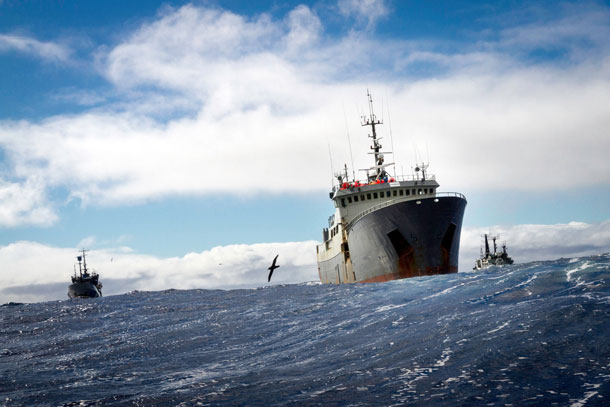
The first story in The Outlaw Ocean focuses on the chase by the Sea Shepherd Conservation Society of the Thunder, an alleged outlaw fishing vessel. (Photo: Courtesy of The Outlaw Ocean)
About seventy percent of our planet is covered by the oceans, but the high seas are among the least-explored frontiers on Earth. And lawlessness is rampant in this vast wilderness, with crimes ranging from illegal fishing to slavery at sea. Pulitzer Prize-winning author Ian Urbina wrote The Outlaw Ocean: Journeys Across the Last Untamed Frontier to tell the harrowing stories of high crimes on the high seas, and he joined Host Steve Curwood at a recent live event in Boston.
Transcript
CURWOOD: It’s Living on Earth, I’m Steve Curwood.
About seventy percent of our planet is covered by the oceans, yet we know more about the surface of the moon than the deep ocean. With such little attention from society it’s also no surprise that lawlessness is rampant out on the open ocean, with crimes ranging from illegal fishing to slavery at sea. New York Times investigative reporter Ian Urbina spent a number of years researching and writing his new book, The Outlaw Ocean: Journeys Across the Last Untamed Frontier. At times he risked his life in his quest to shed light on the dark corners of our seas. Ian recently joined me at the New England Aquarium near our Boston studios for a live event to share some of his stories.
CURWOOD: Ian, let me just start by asking you. The Outlaw Ocean; to what extent do we understand that there's no law out there? I mean, in this society, we live where, hey, if you have a parking ticket, they come for you and they boot your car. I mean, there's a whole system of accountability. And yet out there, there's not.
URBINA: Yeah, so, I approached this space both as a frontier and as an outlaw, by which I mean an extralegal space. It's not the case that there are no laws. There are lots of laws, but the laws are often written in a murky or contradictory way. And then also, laws are only as good as their enforcement. And especially on the high seas, in international waters, there's no, you know, police force that is out there patrolling. So while there are isolated cases of enforcement, they're rare.
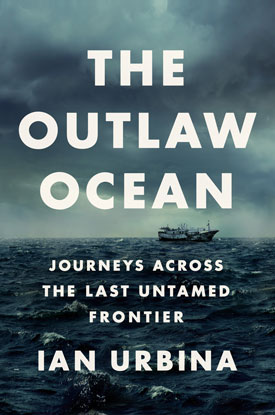
The Outlaw Ocean shares stories of the high seas, where a lack of law enforcement allows lawlessness to run rampant. (Photo: Courtesy of The Outlaw Ocean)
CURWOOD: You decided to...and forgive me about this pun...bookend Outlaw Ocean with stories about the Sea Shepherd Conservation Society. What about their journey stood out to you, and especially you have to tell us the story of the Thunder.
URBINA: Yeah, so for those who don't know, Sea Shepherd is this interesting organization, self-described as a vigilante ocean conservation group. It's an organization that has a large fleet of ships and they go around the world patrolling. And so the book is, as you say, bookended with two Sea Shepherd stories. The front story is about Sea Shepherd's campaign to chase the world's most wanted illegal fishing vessel, called the Thunder. And then the last chapter of the book is a look at a very different campaign, which was Sea Shepherd's harassing of Japanese whaling ships that are whaling, arguably illegally on high seas. And so the Thunder - the bottom line with this story was that there has been this purple Interpol list which essentially is a sort of arrest-on-sight list. And ships would be put on this purple list if they had engaged in demonstrable, repeat illegalities over a length of time. And the Thunder, by some metrics, topped the purple list because it had well-documented decade worth of illegal fishing largely in the Southern Ocean, largely aimed at the Patagonian toothfish, also known as Chilean sea bass, and to the tune of $67 million. And Sea Shepherd said, it's very frustrating that there is this list out there. And yet these ships, to a large degree, are allowed to operate without difficulty. They catch their fish legally or illegally. They go into port, they offload, and they go on, and no one ever arrests them. So Sea Shepherd said, we'd like to do something about it. We'd like to sort of show governments that A) we can find these guys and B) then once we find them, we're going to harass them. And that's different from their whaling campaign where they would actually ram the Japanese and do more aggressive things. On this mission, Sea Shepherd decided we're not going to ram them, we're just going to trail them and every time the ship attempts to enter port, we will raise a stink. You know, contact the media, embarrass the local government, et cetera. And the first task was let's start with the Thunder. It tops the list. We got to find these guys. Sea Shepherd did that within two, three weeks; found the Thunder, nets in the water in an illegal space in Antarctica and thus began this sort of epic tale of what became what some folks have said is the longest sort of nautical law enforcement chase in history. And what occurred was these two Sea Shepherd ships, the Bob Barker and the Sam Simon followed and harassed the Thunder over the course of 110 days and over 10,000 miles from Antarctic waters all the way up to the coast of Africa. And spoiler alert, ultimately, after a chase that involved the Thunder going through really perilous ice fields that most folks usually circumvent, they went straight to the middle, you know, Category Four storm that normally ships wait until it passes, the Thunder went through all, trying to lose their tail essentially. But at some point, the Sea Shepherd guys saw the Thunder guys putting their nets back in the water. They cut the nets and took them and the Thunder turned around and began chasing the Sea Shepherd guys. And so it was this really dramatic escapade and ultimately culminated...uh, shall I?
CURWOOD: Well, wait, you were there, though, for part of this. Tell us how you get aboard this, and what you do to get this story.
URBINA: Yeah, so I got a call from a source at Interpol who said, hey, have you heard about this thing going on down in Antarctica? It's the longest law enforcement chase on the sea. And it doesn't involve law enforcement. And I remember thinking, I don't even understand what that means. But I'm interested, you know, and so I said, tell me more. And he said, it's this conservation group who are sort of self-deputized as vigilantes, and they're chasing this Interpol Most Wanted ship and it's getting really hairy and it's been going on forever. And there are all these interesting shadow players involved. And I said, wow, that sounds epic. Let me try to see if I can get on board. I contacted Sea Shepherd, convinced them to help me think of a way for me to get on board the chase without... obviously, the ships couldn't leave their mark, leave their target, so they couldn't come pick me up and then return because they'd lose their target. And so we had to figure out a method for me to get out to certain coordinates that they likely were going to pass through, and then they would quickly pick me up and fall back in line. So that was a challenging task in and of itself. And ultimately, though, we were able to get to those coordinates right at the deadline, got on board, and then I was embedded with them for a while so I could chronicle the story. The story that ends with the Thunder...
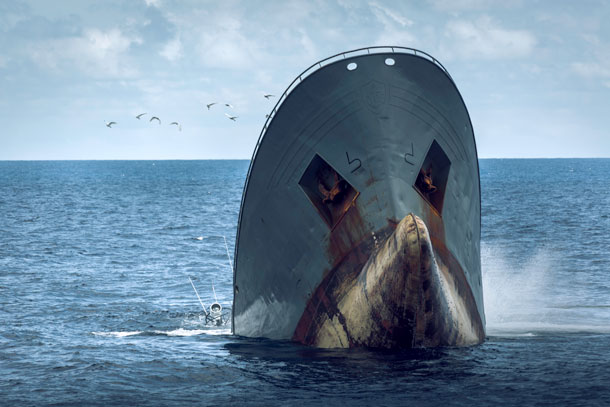
The Thunder as it sinks, shortly after it apparently ran out of fuel following a lengthy chase. (Photo: Courtesy of The Outlaw Ocean)
CURWOOD: Well, but before you get to the end, talk about how you got between the two Sea Shepherd ships to work on the story.
URBINA: So, imagine Navy level ships, and they have high sides. And so the Sea Shepherd vessels obviously don't want to stop at any point. And so the photographer and I wanted to be able to chronicle the experience from both ships, so we had to move back and forth between them. And what that typically means is you get in a smaller boat, and they have a crane that lifts the small boat, and sort of puts it on the water while they're moving. And then you climb down a ladder, and you get in the fast boat. And the fast boat then takes you to the other side, and you do the same thing in reverse. And that ladder process was definitely hair-raising, and especially for my photographer. The funny thing was... this was when I was at the Times, and we had planned to fly this photographer from Brazil, to Ghana, where we were leaving from, and we couldn't get a visa for him in time. So my fixer in Ghana was this young guy who happened to tell me at the last minute, hey, I know how to click a camera. Do you want me to be your photographer? And I said, sure. Are you sure you want to go to sea? I don't know what this is going to be like, it's really... And he said, sure, why not? So I brought him along. And he was amazing. But we were on the vessel and at that very moment, when we were first going to switch vessels, as he was climbing over the railing, he turned to me and said, you know, Ian, thank you so much. This has been the experience of my life. And I said, you're quite welcome. He said, by the way, I don't know how to swim.
And I just remember thinking, geez, this guy's life is going to be on my conscience.
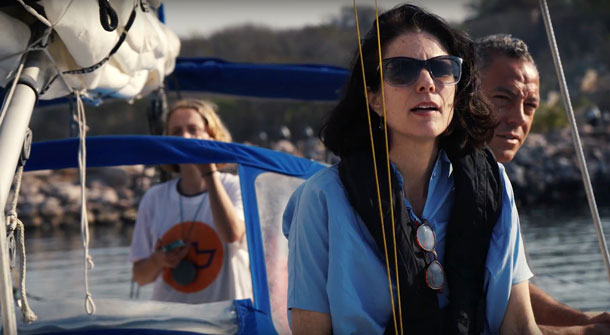
Rebecca Gomperts is a Dutch gynecologist and founder of the Women on Waves organization which provides abortions in international waters offshore of jurisdictions that ban voluntary pregnancy termination. (Photo: Courtesy of The Outlaw Ocean)
CURWOOD: So, you know, I think one of the most striking facts of your story, though, the Sea Shepherds really are breaking the law, they are vigilantes. So, as you've done the research for this work, how often did you have to deal with these sort of morally and legally gray areas?
URBINA: In some ways, the target of the series was the morally and legally gray area. And so as often as I was dealing with it, I was spot on where I wanted to be. And most of the more interesting characters in the book are in that gray space. Whether it's Rebecca Gomperts, a character in the story who provides abortions using a loophole in international law to ostensibly legally provide these abortions, here again, kind of a textbook example of character who's using the law to beat the law.
CURWOOD: Okay, so you have to tell us the story.
URBINA: Yeah, so Rebecca Gomperts, a gynecological doctor, Dutch citizen, worked for Greenpeace for a number of years. And in that work saw some troubling situations with girls and women who needed abortions and could not get access to them. And so she started her own organization called Women on Waves, which essentially, for the past decade and a half, two decades, has operated a ship that goes to countries where abortion is both illegal and often dangerous. And she and her team come into national waters, into port. Usually, surreptitiously, quietly plugs into sort of an underground network of healthcare providers who know of cases of girls and women who are in need, and then quietly brings these women and girls out to international waters. And because the way that maritime law works, such that when you're outside of national waters, the law that applies is the law the flag that you fly. And because her ship is flagged to Austria, the minute the ship would get outside of national waters into international waters, then it becomes legal for her to administer RU-486, pills that would cause an abortion. So, she would do this whole process very quietly, then return the young women back to shore and make sure their anonymity was safe. And then she would hold a press conference to sort of instigate a debate. And that's usually when she would get kicked out the country, as you can imagine.
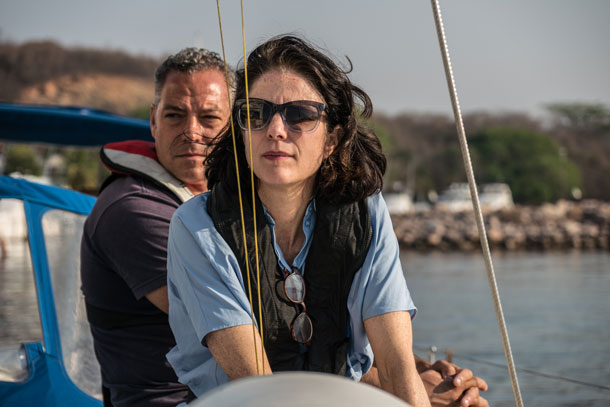
Ian Urbina (left) and Rebecca Gomperts (right). (Photo: Courtesy of The Outlaw Ocean)
CURWOOD: I imagine. So, I have to ask you another adventure story. I think you said your mother swallowed pretty hard when you told her that you were going to Somalia.
URBINA: She was none too pleased.
CURWOOD: And not to spoil the story necessarily, but well, you can tell us whether or not mom was right.
URBINA: Mom is always right, for the record. Yeah. So I told mom very little about actually where I was going before I left. I just said, I'm going to go to Kenya and then I might dip into Somalia. But that's as much as I said. Yeah, the Somalia story was an example of a story where I went in aiming to tell one story, which was actually going to be a good news story about an unusual, successful case of law enforcement where the Somalis and the Kenyans had gotten along and worked together and they caught these repeat offenders. And I did everything by the book because there had been some really bad cases of kidnapping of reporters working on this very topic and so I had permission from the key tribal leaders, et cetera, et cetera. Within a week of being in Puntland, which is mildly put, sort of what Texas is to Washington DC, Puntland is to Mogadishu. In the sense that it is part of the country but, no offense to Texans in the room, but very proudly, defiantly kind of autonomous. And in Puntland's case, it's also the launching zone for a lot of the illegality. So, it's hard to write a book about the outlaw ocean and not go to Somalia, and not go to Puntland specifically. But it's very hard to get into Puntland. The roads are run by ISIS and Al Shabaab. So, you've got to fly in, you can't go by road. And then when you're in there, you got to be really careful about who your security is, et cetera, et cetera. And I thought we had it all set up. The short version, everything went upside down. We ended up losing our security, being told we needed to leave, but there was no plane out, and we had no way to get out. So, we had to hide on the roof of our compound for a while until we could sort of sneak our way out and wait for a plane to come get us.
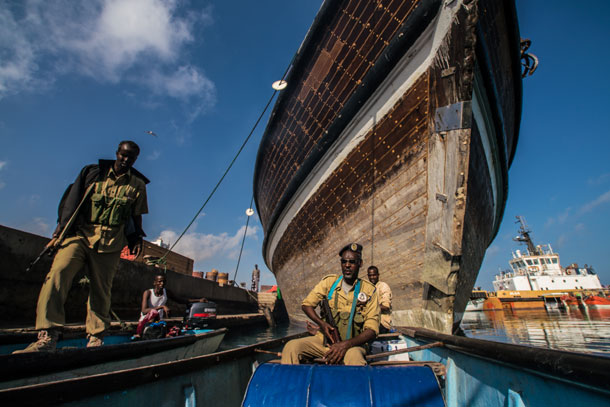
In the port of Bosaso, a team of guards prepares to head offshore and up the coast of Puntland, Somalia. (Photo: Courtesy of The Outlaw Ocean)
CURWOOD: So, there you are hiding on the roof. You've ordered up some security to escort you out to the one plane in the next two or three days. Take us to that moment. What do you hear?
URBINA: Yeah, so I had a special satellite device, so I was still able to text with sources. And the CIA has a drone base not far, and I knew some people over there, and there were no Westerners in our area. And Shabaab was moving in and blowing stuff up, heading towards the compound where we were and I was getting a lot of intel that was saying, you know, there's a lot of chatter about you guys. Everyone knows you're in there and it's not good, and you need to get out quickly, but we had no way out. And I had a fixer who was an American, based in Kenya, who knew the fish scene. I had Fabio, my Brazilian photographer and myself. And the intel we were getting streaming in was saying, you got to get out, you're persona non grata. The Puntland government said they are more than displeased with you, because they don't want you investigating these Thai vessels that are there and they're convinced you're CIA, et cetera, et cetera. Then we started getting even more worrisome intel, which was that within our security detail, we had about 20 guys, there were folks who were loyal to the president of Puntland et cetera. And so our threat was internal, not just external. So then I got really nervous. We had this meeting with the head of security at the compound and myself and the one guy that I really trust to... a guy named Tigey who was a tribal kind of figure and and very loyal and probably saved my life. And Tigey and I decided our plan was to make it look like we were still in the room. Because there was a courtyard that could see where we were staying. Leave the lights on, pull the drapes, make it look like we're staying there, let all of our security go except for Tigey's three cousins, who he knew to trust. And then we would quietly go to the roof and hide out there, but very few people would know we were there. And if a hit occurred, it would hit on our room. And then we would do what? I don't know, I guess sort of try to run, but where to? These are not questions I had clear answers for. So that's exactly what we did. We hid up on the roof for our final night. And there was a plane that was going to be brought in early for us. And we just needed to make it to the next morning. And so we hid up there for that night. Then, the next morning, our plan was to get certain guards that Tigey could call in to help us get to the airport. The roads from where we were to the airport were sort of very narrow roads, you're in a fishbowl. And these were the very roads that we would have to go through to get to airport and there was really only one route we would follow. And everyone knew that there was one plane that had come in. So, everyone knew when those Western guys were going to leave the compound, because there was one plane. So it just seemed like a formula for us to get hit. And so our hope was to leave really early with some reinforcements. That plan didn't go well either, because the plane said they were going to leave early, and we had to go with no guards and just sort of make a run for it. And during our run, we were stopped by two pickup trucks full of armed guys who were not in uniform. And I thought, we have these SOS buttons on our iPhones and I had given the fixer and the photographer clear orders on if we got stopped and pulled out, here's what we should all do. And there we were, stopped and being pulled out. And that was, you know, kind of the scariest moment of the time, but in the end, it turned out that these were Tigey's guys. So we were very lucky and these guys sort of pulled us out, checked us out, and then put us back in and we raced to the airport and got out.
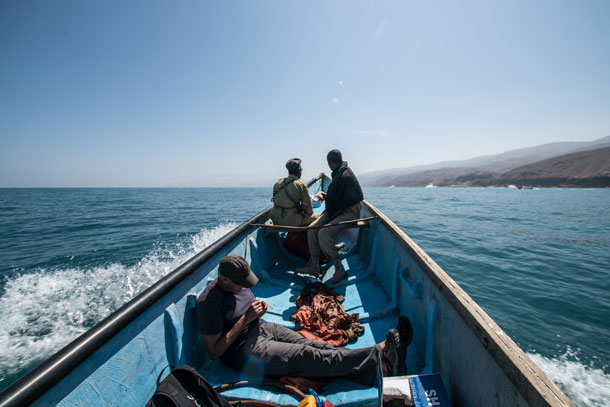
Ian Urbina (center bottom) was told to sit on the floor of the boat to avoid being seen from shore as he and his team travel up the coast of Puntland. (Photo: Courtesy of The Outlaw Ocean)
CURWOOD: Did you kiss the airplane?
URBINA: [LAUGHS] I kissed the ground, I kissed many people. I can't even remember who.
CURWOOD: There's a line at the end of your book. And it's going to be better in your voice. This is from page 408 of The Outlaw Ocean.
URBINA: Yeah, so. The ocean is outlaw not because it is inherently good or bad but because it is a void, like silence is to sound or boredom is to activity. While we have for centuries embraced and touted the life that springs from these waters, we have tended to ignore its role as a refuge of depravity. But the outlaw ocean is real, as it has been for centuries, and until we reckon with that fact, we can forget about ever taming or protecting this frontier.
CURWOOD: So, what's the fix?
URBINA: What's the fix?
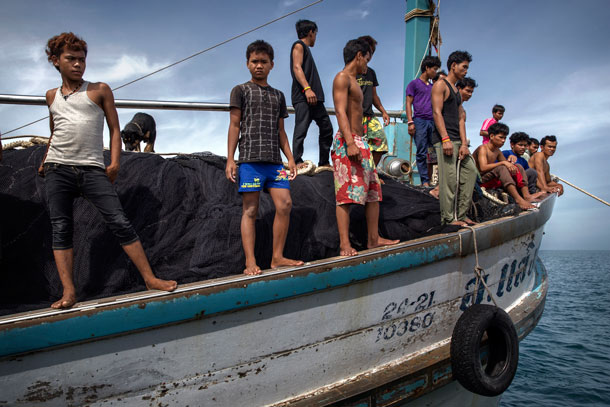
A crew of possibly enslaved Cambodian boys and men work on a Thai fishing ship, several hundred miles off the coast of Thailand in the South China Sea. (Photo: Courtesy of The Outlaw Ocean)
CURWOOD: Yeah, some say the ocean is just too big. It's too vast to be brought to heel. And you would say?
URBINA: I would say, if I wrote a book about injustice, right, and someone said, so what do we do to stop injustice? I would probably say we start by not asking that question, because it's too broad. And I couldn't possibly answer at that altitude. Similarly, what do we do to fix the ocean? That's kind of like how do we win the war? And I would immediately say, don't think about the war. Just choose your battles, and figure out which of the specific components of that war are the ones that you feel most motivated to tackle, right? So again, if it's ocean dumping or plastic pollution or murder or protection of seafarers, or, you know how we handle stowaways post 9/11 or seafood supply chains. I think the smartest move is to not think about the war. I do think there are some solutions that are emerging that traverse those silos, that sort of cross them, that would benefit the environmental and the human rights and labor issues. So, for example, if you think of the aeronautics industry, if you were to walk up to a pilot of a 747, and say, so, you've called ahead, they know you're coming, we'll see you your entire route, you're going to keep that thing on. We know what cargo you're carrying. We know everyone on board, all their names are registered on both sides, et cetera, et cetera. These answers would be readily and easily answered, right? In much of the world, in the long-haul fishing realm, if you asked a boat captain these questions, they would look at you like you were crazy to even be asking those questions. So, there is a cultural issue that needs to be confronted that's in the maritime space that allows this realm and those who operate in it a certain level of liberty. That is a core problem in my view. And so, whether ships have a unique identifier, a license plate that everyone can see, that stays the same, and there are serious consequences if you attempt to change it, that would be one step. Not being normal or allowed to turn off your transponder and, in fact, imposing transponders that you can't turn off at all; another thing that could be a big step forward. These are lofty ideals, difficult to actually implement, but could be a big step forward to actually tracking who's moving what, where and how and what's happening to the fish and the people that work there.
CURWOOD: And I have to ask this as well. Through all these difficult situations, share with us an up lifter.

Ian Urbina is a Pulitzer Prize winning journalist and author of Outlaw Ocean. (Photo: © Jabin Botsford)
URBINA: There's a lot of beauty out there, both in the space and the people. That's why I often say like, it's extralegal. Even sometimes it's purely illegal, but it's not always bad. The characters I met along the way, the sort of underground network of anti-trafficking advocates who specialize in helping sea slaves, essentially, debt-bonded or even just shanghaied workers, some of them shackled, escape is really inspiring. And often those guys are breaking laws. The Rebecca Gomperts types that are out there trying to use the law in creative ways and use the high seas in creative ways to help in their view, I think are really impressive. And then also just, for all the gloominess of the reporting and the abuses it highlights, for the most part, the crew on these vessels, some of them as young as 13, their will to survive, their sort of scrappy ingenuity to make the time pass, their camaraderie, their sense of humor, their work ethic is really inspiring. They're not sort of downtrodden, somber faced, even in the midst of really harsh conditions. So I find those things inspiring.
CURWOOD: Ian Urbina's new book is called The Outlaw Ocean: Journeys Across the Last Untamed Frontier. Ian, thanks so much for spending the time with us.
URBINA: Thank you.
Links
Living on Earth wants to hear from you!
Living on Earth
62 Calef Highway, Suite 212
Lee, NH 03861
Telephone: 617-287-4121
E-mail: comments@loe.org
Newsletter [Click here]
Donate to Living on Earth!
Living on Earth is an independent media program and relies entirely on contributions from listeners and institutions supporting public service. Please donate now to preserve an independent environmental voice.
NewsletterLiving on Earth offers a weekly delivery of the show's rundown to your mailbox. Sign up for our newsletter today!
 Sailors For The Sea: Be the change you want to sea.
Sailors For The Sea: Be the change you want to sea.
 The Grantham Foundation for the Protection of the Environment: Committed to protecting and improving the health of the global environment.
The Grantham Foundation for the Protection of the Environment: Committed to protecting and improving the health of the global environment.
 Contribute to Living on Earth and receive, as our gift to you, an archival print of one of Mark Seth Lender's extraordinary wildlife photographs. Follow the link to see Mark's current collection of photographs.
Contribute to Living on Earth and receive, as our gift to you, an archival print of one of Mark Seth Lender's extraordinary wildlife photographs. Follow the link to see Mark's current collection of photographs.
 Buy a signed copy of Mark Seth Lender's book Smeagull the Seagull & support Living on Earth
Buy a signed copy of Mark Seth Lender's book Smeagull the Seagull & support Living on Earth

